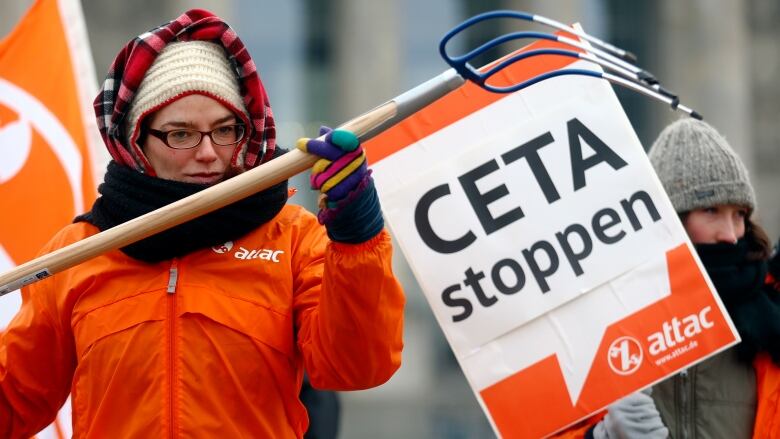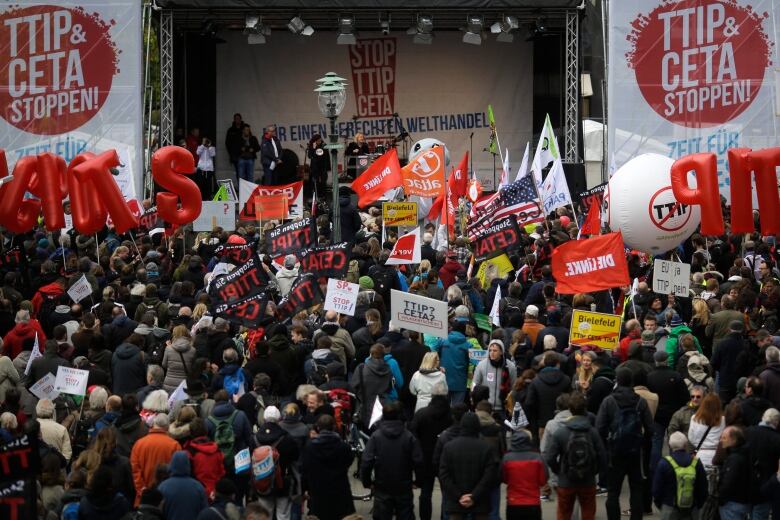Chrystia Freeland courts a distracted EU partner on CETA vote
Trade minister distances Canada from anti-U.S. sentiment: 'Talk to us in our own right. OK guys?'

The United States is not a partner in the Comprehensive Economic Trade Agreement.
Really, it's not. Chrystia Freeland wants that clear.
But thetrade minister was forced to addressthe American elephant in the room in Brusselslast weekwhilelobbyingmembers of the European Parliamentfor votes on Canada'strade deal.
"Sometimes when Canadians and Europeans speak we want to just have atte--tte, but it becomes a mnagetrois. Let's not make our relationship a mnagetrois," she told the EU Parliament's international trade committee.
- Liberals waver on trade deal compensation Tories negotiated with farmers
- Canada moves a step closer to ratifying 'gold-plated' trade deal with EU
- EU quietly asks Canada to rework trade deal's thorny investment clause
Highlighting Canada's independent policiesonrefugees,climate change andthe Iraqwar, Freeland'seffortto consummateCETAmade a simple plea: "We're a G7 country. Talk to us in our own right. OKguys? Please."
The long engagement between Canada and the EU on CETA facesratification votes in Brussels and Ottawa within a year. Freelandhit Berlin and Brussels this month,with more capitalsto come.
"I would love unanimous support in your Parliament. I'm gunning for it in mine," Freeland said.
"You are not going to get a better deal. And this deal will be a very important precedent for progressive trade deals going forward."
That's the pitch. But it's also a hitch.
Precedent or TrojanHorse?
Last weekend, anti-trade protestershit the streets of Hannover, Germany, ahead of U.S. President Barack Obama'stalks withGerman Chancellor Angela Merkel.
Civil society groups agree with Freeland that it'sa precedent but not a good one. More like a TrojanHorse: giving access toU.S. corporationswith Canadian subsidiaries.
The crowd reportedly between 35,000 and 90,000 carried signs denouncingTTIP (the acronymn for a potential EU-U.S. deal) andCETA.

As the EU ambassador to Canada explained in January, opposition to Canada's deal didn't mobilize until it looked like CETAset America's stage.
Merkel's vice-chancellor, Social DemocratSigmar Gabriel, was once the voice of thisskepticism. But rewritingthecontroversial investor-statedispute clausehasquieted that.
"The demonstrations have helped us by drawing our attention to what's at stake," Gabriel said after meetingFreeland April 14.
Did Canada capitulate?
"They thought that it was going to be a kind of a fight but for us it was the opposite. We believe in it," Freelandsaid, beside him."Certainly in our values, we feel we're a European country."
ConsideringFreelandchairs Prime MinisterJustinTrudeau'scabinet committee onCanada-U.S. relations and uses apicturefromthe Oval Office as acover photo on Twitter is that a bit of a slap?
'Bigger playground for lawyers'
Canada agreed to Europe's investment court proposal instead of standing bypost-NAFTA improvementsworked out with the U.S. duringthe Trans-Pacific Partnership (TPP) talks. Doesn't that burn?
"Only if you believe a lot of people in the public and the political system in the United States even know what Canadadid," said Jeffrey Schott from Washington's Peterson Institute for International Economics.
"I don't sense any strain," he said. As for the "shared values"bit,"that's what American negotiators say when they go to Europe, too."
There are still inconsistencies inthe dispute settlement processes foreach deal."It's a bigger playground for lawyers, that's for sure," Schottsaid, but"everybody knows the United States is not going to allow Canada to influence its negotiations with Europe."

Someone tell the Europeans.
"If we succeed in [ratifying CETA], it would mean, for the negotiations with the United States, that nothing less would be acceptable," Gabriel vowed.
All aboard?
Freeland,chuffed to have Gabriel onside, told journalists on a conference callthat if she were covering her Berlin visitGabriel's swing votewould be her highlight. Hint, hint.
But hedoesn't speak for everySocial Democrat. Not in the Bundestag, nor Brussels, where other parties opposeit too.

Members of the European Parliamentfrom the Socialists & Democrats (S&D) blocaskedFreeland more questions than she could answerThursday.
David Martin, a Labour MEP, said he would havevotedagainstthe deal if ithadn'tchanged.
"Are you listening [U.S. Trade Representative] Mike Froman?" he intoned in his Scottish accent. "Are you listening America?"
Belgian MEP Maria Arena said CETAopens the door to U.S. companies taking advantage.
"Just because we're criticizing the agreement, doesn't mean we're criticizing Canada," she said.
Austrian Karoline Graswander-Hainz asked ifother chapters couldbe reopened. Perhapsa "third way," so they didn't have to vote yes or no?
Freelandsympathized, even sayingshe may share someconcerns herself "to a degree."But if the EU can't do a deal with Canada, "who can we do a deal with? I mean, really?"
Committee chair Bernd Lange played off themovie Casablancato conclude, telling Freeland"this is the beginning of a wonderful friendship."
Uncertain head count
Thosefighting the ground war on both sides were left trying to cut through the fog in Brussels.
The Canadian Cattlemen's Association saysbeef exports to Europe could growto $600 millionfrom $10 million under CETA. But until the EU certifies Canada's meat processors, newmarket access exists onlyon (unratified) paper.
Will it pass a vote?
"I don't know if anybody has a head count," theCCA's JohnMasswohl said.
Council of Canadians campaigner Maude Barlowtouredsix European cities this month, targetingmedia and politicians at every stop to oppose the deal.
Will Freeland'scharm offensivework?

"I met with a number of Social Democrats who don't like either agreement but don't want to be the ones to kill the 'good'deal with nice Canada," Barlow wrote CBC News.
While still criticized, the investment clauserewrite provides an excuse to change sides.The debate's more heated now and the vote's tight, she said.
"I really believe if we can delay this for six months to a year, we can stop CETA."












_(720p).jpg)


 OFFICIAL HD MUSIC VIDEO.jpg)
.jpg)



























































































